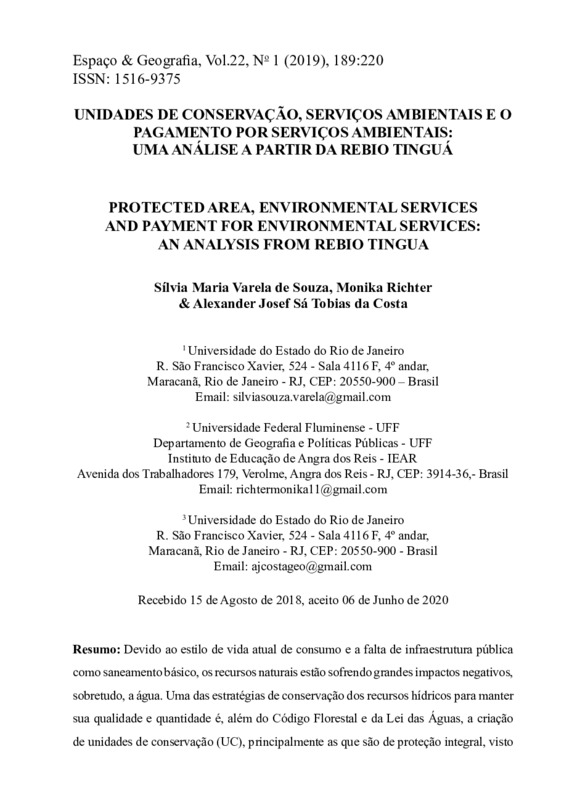-
Título
-
UNIDADES DE CONSERVAÇÃO, SERVIÇOS AMBIENTAIS E O PAGAMENTO POR SERVIÇOS AMBIENTAIS: UMA ANÁLISE A PARTIR DA REBIO TINGUÁ / PROTECTED AREA, ENVIRONMENTAL SERVICES AND PAYMENT FOR ENVIRONMENTAL SERVICES: AN ANALYSIS FROM REBIO TINGUA
-
Revista Espaço e Geografia
-
UERJ
-
UFF
-
Description
-
UERJ
-
Autor
-
Sílvia Maria Varela de Souza
-
Monika Richter
-
Alexander Josef Sá Tobias da Costa
-
Assunto
-
recursos hídricos
-
reserva biológica
-
serviços ambientais
-
unidade de conservação
-
Abstract
-
Devido ao estilo de vida atual de consumo e a falta de infraestrutura pública como saneamento básico, os recursos naturais estão sofrendo grandes impactos negativos, sobretudo, a água. Uma das estratégias de conservação dos recursos hídricos para manter sua qualidade e quantidade é, além do Código Florestal, a partir da criação de unidades de conservação (UC), principalmente as de proteção integral, visto não permitirem o uso direto dos recursos. De acordo com o Sistema Nacional de Unidades de Conservação (SNUC), Lei 9.985/2000, o principal objetivo das UCs é manter a diversidade biológica, sendo também de fundamental importância a proteção da qualidade dos recursos hídricos dentro desses espaços. Neste contexto, a história da serra do Tinguá está diretamente relacionada com suas águas. A região possui proteção desde 1880, época do Império, por conta dos seus mananciais que já abasteceram a nobreza da cidade do Rio de Janeiro. Em 1941 foi declarada Floresta Protetora da União e em 1989 passou a ser Reserva Biológica (REBIO). Atualmente, a REBIO do Tinguá possui 31 captações ativas de água administradas pela CEDAE dentro da unidade sem qualquer tipo de poluição, produzindo água de excelente qualidade e, em quantidade, e que abastecem boa parte da população da Baixada Fluminense. No entanto, mesmo que este recurso seja para abastecimento humano a captação e a distribuição devem ocorrer em conformidade com a Lei do SNUC e com a Política Nacional dos Recursos Hídricos, Lei 9433/1997. A concessão de outorga deveria ocorrer após parecer e anuência da Unidade, bem como deveria haver compensação por este serviço ambiental promovido pela floresta existente e protegida enquanto REBIO. Due to the current consumption lifestyle and the lack of public infrastructure such as basic sanitation, natural resources are suff ering great negative impacts, especially water. One of the strategies for conserving water resources to maintain their quality and quantity is, in addition to the Forest Code and the Water Law, the creation of conservation units (UC), especially those that are fully protected, since they do not allow direct use resources. In this context, the objective of this study seeks to contextualize Rebio Tinguá, to highlight the relevance of the environmental water service promoted in the Baixada Fluminense region, as well as to analyze aspects related to the Payment for the Environmental Service (PSA) for water production as fi nancial compensation for the service provided. , which can become a signifi cant alternative source of funds considering the lack of investments that most UCs currently receive. This is an exploratory research, in which diff erent sources of consultation were used, including articles and scientifi c texts. Field research was also carried out on the water abstractions existing within the unit, aiming at recognition, photographic records, location and various notes. The results show that the history of the Serra do Tinguá is directly related to its waters. The region has been protected since 1880, the time of the Empire, due to its springs that have already supplied the nobility of the city of Rio de Janeiro. In 1941 it was declared the Union’s Protective Forest and in 1989 it became a Biological Reserve (REBIO). Currently, REBIO do Tinguá has 31 active water withdrawals managed by CEDAE within the unit, producing quality water, in quantity, which supplies a good part of the population of the Baixada Fluminense. It is concluded that even if this resource is for human supply, the capture and distribution must take place in accordance with the SNUC Law and the National Water Resources Policy, Law 9433/1997. The granting of the concession took place without the opinion and consent of the Unit, and there should be compensation for this environmental service promoted by the existing forest and protected as REBIO, as provided for in article 47 of the SNUC.
-
volume
-
22
-
issue
-
1
-
Date
-
2019
-
Língua
-
pt
-
issn
-
2236-5656
-
título curto
-
UNIDADES DE CONSERVAÇÃO, SERVIÇOS AMBIENTAIS E O PAGAMENTO POR SERVIÇOS AMBIENTAIS
-
Rights
-
Direitos autorais 2020 Revista Espaço e Geografia


